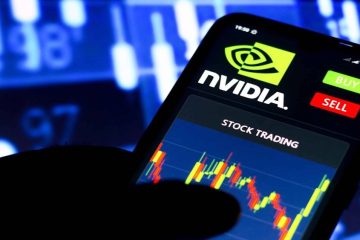Why Google’s Stock Price Leapt and Crashed In an Instant

Fluctuating currency exchange rates and shifting accounting rules helped make first quarter results at Alphabet, Google’s parent, appear a little better than they really were on Monday. That fooled some investors for a few minutes, causing a momentary surge in Google’s stock price in after-hours trading.
But once analysts cut through the complications, the share price dropped back to where it was before the results came out. Bottom line? Investors are still concerned about the potential impact of privacy regulations, increased competition, and pressure to combat offensive content.
The initial stock surge came as Alphabet said that first quarter revenue jumped 26% to $ 31.15 billion and net profit rose 73% to $ 9.4 billion, or $ 13.33 per share. Analysts had forecast revenue of $ 30.29 billion and earnings per share of $ 9.28. Wall Street’s immediate reaction? Alphabet’s stock price, which had closed at $ 1,073.81 on Monday, jumped almost 5% in an instant to $ 1,123.99.
But once investors read beyond the headlines, they discovered a small section in Alphabet’s press release that was harmlessly labeled: “Q1 2018 impact from equity securities*”
That section laid out that a change in accounting rules now required Alphabet to include the change in value of any shares it owned in private companies, such as Uber, in its profits even if just held onto to its stake and didn’t buy or sell any more shares. The trigger for a change now can include transactions by the private company. For example, Uber sold new shares to SoftBank Group in January in a deal that valued the ride hailing startup at $ 48 billion, significantly higher than the nearly $ 4 billion valuation at which Google had bought its stake in the company five years ago.
Get Data Sheet, Fortune’s technology newsletter.
Under the new accounting rules, that meant Google had to mark up its stake in Uber, likely by a considerable amount, and report the unrealized gain as income. The same treatment would apply to stakes in other private companies Google had acquired through its GV venture capital unit. In Monday’s report, Google lumped all of those gains together and disclosed that they added over $ 3 billion to its pre-tax profits. After some tax and fee considerations, the result was $ 2.4 billion, or $ 3.40 per share, added to net profit. Without the accounting boost, net profit would have been $ 7 billion, or $ 9.93 per share.
Another number that may have dampened investor enthusiasm was the impact of foreign currency fluctuations. Alphabet’s 26% revenue gain would have been only 23% if the dollar’s value hadn’t risen against foreign currencies, meaning the $ 31.14 billion would have been only $ 30.07 billion, or slightly less than analysts had forecast. When the trend was the other way—and a sinking dollar was reducing revenue gains—Alphabet and other companies were quick to point out the discrepancy. Now that currency moves are bolstering revenue, companies aren’t raising the issue.
But as investors digested the two factors that had little to do with Alphabet’s (googl) core business results, the after hours stock gain evaporated. By the end of a call by management with investors at around 5:30 p.m. ET, the company’s shares had inched lower to $ 1,073 from the close.










